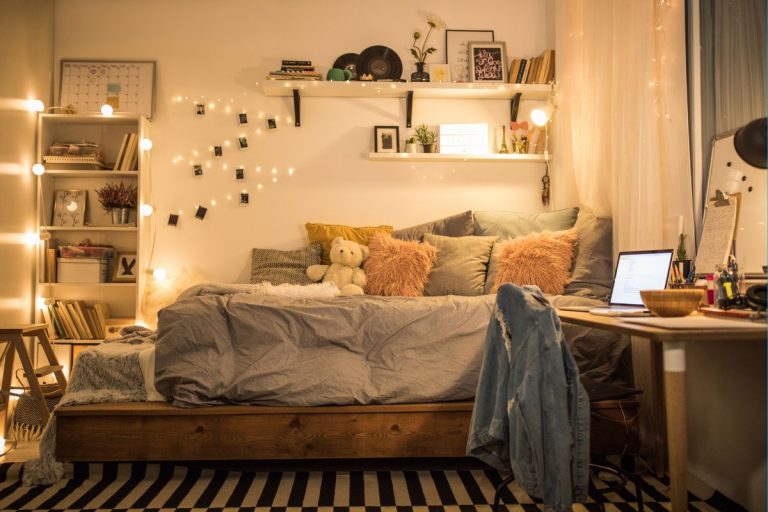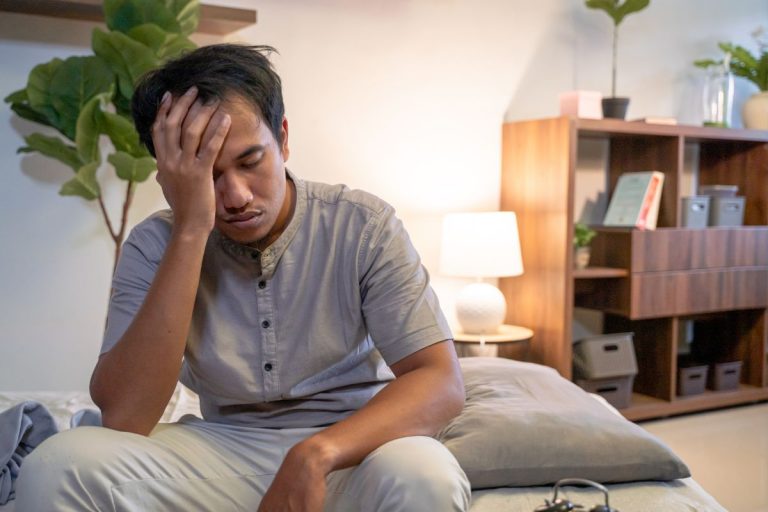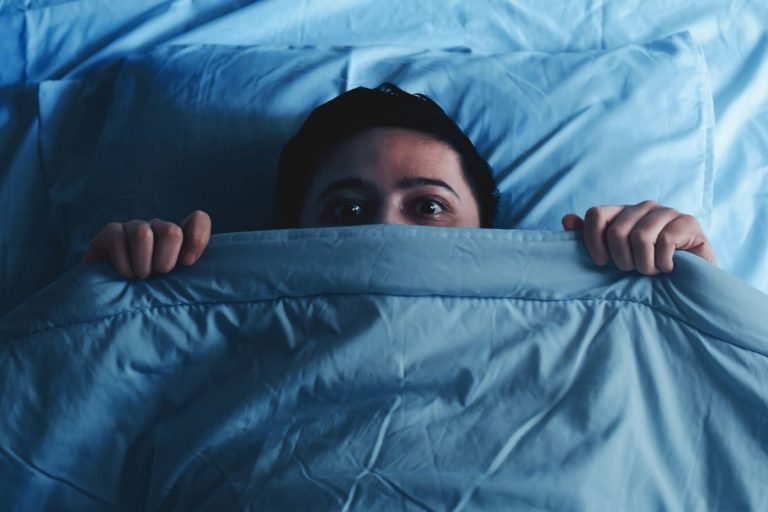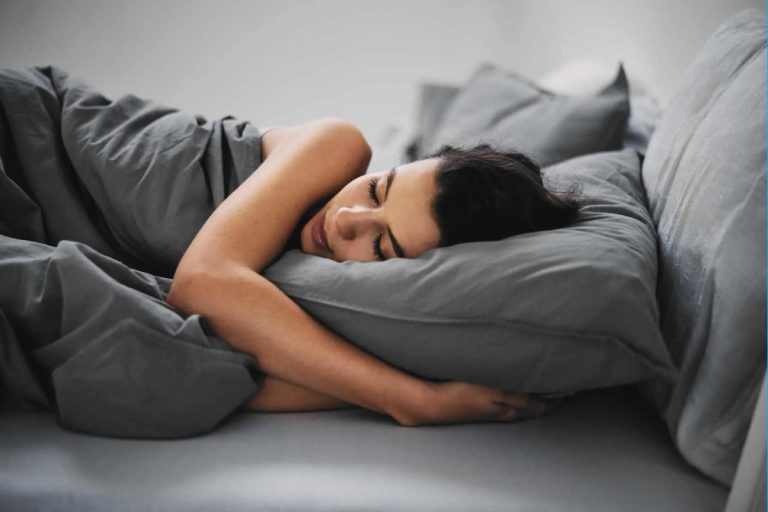Arachnophobia is a real problem. Phobias are debilitating. They can stop you from enjoying your life. Many fears are irrational, but this doesn’t stop our mind from conjuring catastrophic images when in presence of the fear’s cause.
There is an urban legend claiming we eat spiders while we sleep. But it’s just a myth. Imagine you were a tiny spider trying to survive in a room. Assume you gather the courage to get close to a gigantic human, and you somehow end up on their face. You’d feel the extreme heat and wind coming out of their mouth—assuming they sleep with their mouth open—and decide to leave immediately.
But even before considering if you should crawl up a bed and get into a human’s mouth, think about the size difference. Spiders are terrified of humans. What would they gain by climbing on us? We aren’t food for them; we don’t provide them with shelter—at least not directly with our body—so they ignore us. Unless we move around them. Then they run for their lives.
That’s what actually happens when you sleep. No spider will ever come close to your mouth, let alone jump in. And even if it happened, how are we supposed to swallow it while we sleep?
Even if you aren’t scared of spiders, you don’t want to have these little buggers running around while you sleep. Spiders aren’t dangerous, but it’s hard to sleep peacefully if you feel like they are crawling around you.
The overwhelming majority of house spiders are harmless. At most, you’ll feel a minor irritation around the bitten area for a couple of hours, but nothing to worry about. And no, you won’t turn into Spiderman, sorry.
In this article, we are going to see ways to keep spiders away from your room while you sleep, and what attracts them to your room.
Why Do Spiders Enter Our Homes?
Spiders, much like everything on this planet, are just trying to live their life. They enter homes looking for food, water, and shelter.
Spiders enter homes through cracks in the wall, air vents, or windows. It’s almost impossible to patch up your entire house to keep them out, so don’t bother. Even if you do your best, there’s most likely a hole somewhere you don’t know about where they can freely come in.
Eventually, you will open your windows to refresh your home’s air. They’ll jump in right then, and you can’t do anything about it.
Since we are talking about spiders while sleeping, there is a specific reason spiders get into bedrooms. Beds are great for spiders, since they offer a warm and sheltered place where they can spend the coldest months without disruption.
Spiders are always looking for food and water. If you keep these two things around your bedroom, they’ll try to sneak in and feast on them. Plus, other insects will do the same, making your room even more attractive to spiders.
6 Ways to Keep Spiders Away While Sleeping
Keeping spiders away is easy. They are afraid of us, and they mostly just want to live their life without annoyance.
Warning: don’t wait until your house is full of spiders. If you see over 2-3 over 2 weeks, start implementing the strategies on this list. You don’t need to use all the methods. Start with one or two, and you’ll start seeing less spider crawling around your room.
1. Keep Your Bedroom Clean
This is the easiest and most important thing to do to keep spiders away while you sleep. A well-kept room doesn’t attract spiders, nor their primary prey: insects. Leaving small crumbs of food around your room is going to allure spiders in.
If you have a trashcan in your bedroom, empty it regularly. Don’t let food or other waste rot in there for long. It becomes a breeding ground for many beasts.
A clean bedroom will also improve your sleep’s quality. If you’re healthy, you sleep better, and if you sleep better, you’re healthy.
Editor’s note: unless you are having a serious spider problem, this should be enough to reduce the number of spiders crawling around your bedroom.
2. Keep the Lights Off
Spiders don’t care about lights, but the insects they love eating do. If your house is full of potential spider preys, your house will swarm with spiders real soon. Turn off any light you aren’t using.
Using other means of keeping insects away—like mosquito nets—are also effective for the same reason. Anything that keeps the spiders’ favorite banquet out of your house is fine.
3. Use Spider Repellents
There are two types of spider repellents:
- Sprays
- Ultrasonic repellers
Sprays are a cheap and effective way of scaring spiders away. A product like this one will keep you sleeping like a baby without fearing spiders will crawl on your bed. There are some downsides to using a spray though.
The smell can annoy some people. Especially since it’ll be in your bedroom. If you are sensitive to it, sleeping might be hard. If you are environmentally conscious, you won’t like the plastic bottle it comes in either.
Ultrasonic repellers are another excellent solution. They scare spiders and other insects away with ultrasounds. Since humans (or pets) don’t hear the ultrasounds, they are an effective way to keep spiders away while you sleep.
What’s great about these repellents is that they not only deal with spiders and insects but also with mice. It’s always a nice plus to keep these disruptive rodents away. Their biggest downside is that they aren’t as universal as sprays, since you need to plug them into a socket.
Both solutions work well, and both can be used inside and outside with no issue. It’s mostly a matter of preference. You can also combine them if spiders in your area are particularly tenacious.
4. Keep Your Plants Clean
Spiders love to hide between leaves waiting for preys to fall into their web. If they spot plants inside your bedroom, they’ll try to make their home around it. Another thing they love is moisture, which coincidentally is offered by plants.
What does keeping plants mean in this case? It’ll be enough to remove the leaves’ dust with a brush before watering the plants.
5. Use Essential Oils
If you don’t like the idea of using chemical sprays, essential oils are a natural repellent for spiders.
Particularly, spiders loathe peppermint, but there are others that are just as good. Spraying your home with peppermint, or sprinkling around a couple of drops of lavender oil will keep those creatures away.
Another benefit of using essential oils is that other annoying animals will run away from it. Examples include raccoons and mice.
Using essential oils is 100% safe for humans and pets too. You don’t want your dog to accidentally lick an area sprayed with chemical repellents. Or your kid. Peppermint is safe for both.
6. Check Unused Drawers
Unused drawers are great for spiders. They can live without anyone disturbing them, and they can get out whenever they wish. It’s like paradise for them.
Naturally, if you use the drawer often you’ll scare spiders away from it. But if you have a wardrobe or any other piece of furniture that you never check, you might find a nasty surprise in it.
Are Spiders Dangerous? What About their Webs?
Almost all spider species in North America are harmless for humans. Even those that are won’t bite you unless provoked. Spiders are scared of humans. They perceive us as big threats, so they’ll try to run away from us. Unless you actively try to get bitten, you will be safe.
There are venomous spiders in the United States. If you get bitten and the area starts swelling after a couple of days, visit an emergency room. But what if you were bitten by a spider you don’t recognize? If you think it might have been a dangerous one, rush to the ER.
The Mayo Clinic offers an article full of valuable advice on how to proceed after a spider bite.
Spider webs are not dangerous. Apparently, they are edible. They won’t taste good, and you won’t get anything out of it from a nutrition standpoint. But you can eat them without health repercussions, if you so wish.
The only thing that could make spider webs dangerous is their inflammability. If they are close to a heat source, they risk catching fire.
Conclusions
Most spiders are harmless. Some people respect them because they help getting rid of annoying insects like flies. Others find them cute. There are YouTube channels dedicated to showing off spiders as pets.
Now you know why you should keep spiders away while you are sleeping, and how to do it. Having a lot of these arthropods (remember, spiders are not insects!) around is a sign you need to improve your room’s hygiene.
Having the occasional spider pop up during winter isn’t a concern, but if you see multiple spiders crawling around, it’s time to take action.
One last word before departure: you don’t have to kill spiders. They keep annoying insects like mosquitoes away. If you, like me, don’t like killing harmless things, you can just pick them up with a sheet and release them outside. I’ve never had a spider come back into my home after I’ve done it. They seem to understand they must look for another shelter.
Also Read:





